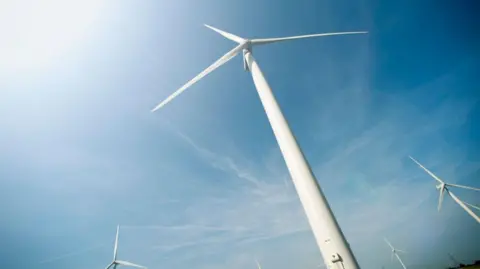 PA
PALabour will bring a “huge number” of skilled jobs to Scotland by basing the HQ of its new energy company there, Sir Keir Starmer says.
The party plans to create a publicly-owned company called Great British Energy.
On an election campaign visit, the Labour leader said the firm would drive the transition to clean energy and make sure “those jobs are in Scotland rather than other countries”.
The SNP has criticised the the project, saying it could risk 100,000 jobs in the north east of Scotland.
Speaking to BBC Radio’s Good Morning Scotland programme, Sir Keir said Great British Energy would be set up very quickly “if we are privileged enough to come into power”.
He said: “As we transition into clean power there is the potential for a huge number of skilled, long-term, well-payed jobs.
“GB energy will be the driver of that to make sure that those jobs are in Scotland.
“In Europe, in America, initiatives are already under way to get ahead on renewables. I want Scotland, the UK to be in the race.
“We will base it in Scotland as the energy sector is so important in terms of renewables.”
Sir Keir was joined by Scottish Labour leader Anas Sarwar in Greenock, Inverclyde, at a campaign event to launch their election offer for Scotland.
 PA Media
PA MediaGreat British Energy would be headquartered in Scotland, where much of the UK’s oil and gas and offshore wind industries are based.
Labour would fund the company through a windfall tax on oil and gas firms, which they said would raise £8.3bn over the next five years.
Great British Energy would invest in wind and solar projects, as well as new technologies including floating offshore wind, hydrogen and carbon capture and storage.
But the SNP has said the scheme would use “Scotland’s energy wealth” to fund nuclear projects in England and could cost thousands of North Sea jobs.
Deputy leader Kate Forbes told BBC Breakfast that neither Labour nor independent experts “seem to understand or know what GB energy actually is”.
She said: “We know that in Scotland a lot of our jobs depend on the energy industry.
“Independent experts have suggested that the plans would perhaps jeapordise 100,000 jobs in the north east of Scotland.
She added: “We all know that we need to reach net zero, but Labour appears to be saying to workers you’ll lose your jobs now – but there may be some jobs in 10 years time if you hold on.”
The Scottish government previously pledged to set up a publicly-owned, not-for-profit company to sell gas and electricity to customers at low prices by 2021.
The plan was announced by Nicola Sturgeon at the SNP conference in 2017, but was eventually ditched without the company being created.
 Getty Images
Getty ImagesSir Keir rejected suggestions that the GB Energy project would bring job losses and said: “I’m convinced transition will bring more jobs to Scotland”
He added: “We’re not going to turn the pipes off instantaneously, we’re not going to revoke any licences in place.
“The question is what we do about the transition, with oil and gas for decades to come as part of the mix.”
The Conservatives criticised Labour’s moves to stop new oil and gas licences in the North Sea, claiming jobs would be at risk.
Scottish Conservative MSP Murdo Fraser told BBC Scotland News: “Many experts on energy policy have looked at this and wondered how is it going to deliver what Keir Starmer is claiming.
“How are we going to be able to buy and sell energy more cheaply than the very competitive energy market we now have?
“People are wondering what difference it is going to make?”

Whether he wants to or not, Sir Keir Starmer is picking a fight with fossil fuel firms as he visits Inverclyde.
He insists any Labour government will ensure that oil and gas are part of the energy mix for decades to come.
“We’re not going to turn the pipes off instantaneously… we’re not going to revoke any licences that are in place,” he told Good Morning Scotland.
But the government does not directly control “the pipes”. Those decisions will be taken in boardrooms, albeit informed by taxation levels, not in Downing Street.
Aberdeen and Grampian Chamber of Commerce has criticised SNP and Conservative energy policies but it says Labour “wants to make things even worse,” by extending the Tories’ windfall tax on oil and gas profits and removing some tax breaks for investment.
It claims confidence is at an all-time low, existing investment could be withdrawn and job losses may follow.
Insider are also sceptical that GB Energy could bring down domestic fuel bills.
“It’s nonsense. Utterly misleading,” one senior figure told me.
Environmentalists, however, are encouraged by the direction of travel.
“Climate science could not be clearer that we can’t allow any new oil and gas extraction. We need a fair and fast transition to renewable energy,” said Rosie Hampton of Friends of the Earth Scotland.


The Scottish Greens want Scotland to reduce its reliance on fossils fuels, and have said they will create a fair and sustainable energy system for the future.
Co-leader Lorna Slater criticised Great British Energy as “an investment vehicle” rather than the public energy company Labour previously promised.
She said: “When Labour abandoned their pledge to invest £28bn into tackling the climate emergency, they at least retained a commitment to a publicly-owned energy company. But now even this appears to have been watered down.
“Scottish Labour need to stop misleading Scotland and clarify immediately whether they will stand by their pledge.”
The Liberal Democrats have vowed to invest significantly in renewable power so that 80% of the UK’s electricity is generated from renewables by 2030.
The party also wants to improve standards for new homes to ensure they are warm, cheap to heat and produce zero emissions.


